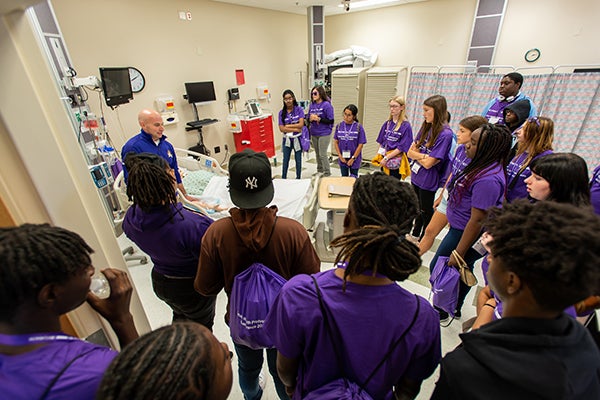ECU, ECU Health provide school children glimpse of possible health care careers
Seventy-five middle and high school students from communities in 15 eastern North Carolina counties spent their Saturday getting a first-hand understanding of what careers are available in the health care fields.
The inaugural Future Health Professionals Conference held Oct. 15, hosted jointly by ECU Health and East Carolina University’s Brody School of Medicine, offered the visiting students opportunities to interact, one-on-one, with faculty, students and staff from across the organizations.
Students listened to several guest speakers, including the dean of the Brody School of Medicine and CEO of ECU Health Dr. Michael Waldrum, before taking tours of ECU’s medical, dental and nursing schools.

Students from across eastern North Carolina visited the East Carolina University Health Science Campus on Oct. 15 to learn about the opportunities ahead of them in a variety of health care professions. (Contributed photo)
Waldrum spoke about being a young teenager and realizing that he wanted to pursue a career in health care, which required giving up some of the social aspects of being a high schooler. It was worth the hard work and staying focused on a goal, he said.
“Being an old guy, looking back and remembering where you are, I can tell you that living that life has been really great. Scary. Hard. But great,” Waldrum said. “Nothing in life that is meaningful doesn’t require hard work and you are going to have people try and pull you off that track. You’re going to have to realize that you get to make your own choices, if you want to follow a path that leads to a meaningful life.”
Waldrum urged the students to not let others “get in your head” and try to push them off of a path to success because “you are as smart as any of us, and you have the capability to have a meaningful life.”
Brody medical student Quashawn Chadwick spoke to the assembled students before they were separated into three groups to tour the schools. Chadwick, a native of Albermarle, North Carolina, spoke about the challenges he faced with early childhood housing instability and the successes he has since achieved, earning a Master’s degree from the North Carolina School of the Arts before continuing his post-baccalaureate education in biology at UNC Greensboro.
Chadwick spoke to the assembled students about his successes in education and life, but also about his lack of self-confidence, brought about in part by being raised in poverty and without any role models who had graduated from college, let alone applied to medical school.
“My first real patient interview and physical and small group clinic about a mile away from campus,” Chadwick said. “The patient was in pain. I had been trained. My colleagues looked at me and asked me if I was up to the task. The only real question was whether I had the nerve. I’m not the smartest person in the room. But for me, instead of reflecting on shame, I say ‘thanks.’ I say ‘please.’”
One of the main goals of the conference was to help high school-aged students, who have an interest in health care career fields, begin to understand how to start mapping out experiential and educational paths to reach their goals.
The students were also introduced to some of the administrative and business aspects of health care, which aren’t typically the storylines for primetime television dramas — administration, information systems management, human resources and facilities management — but are in many ways the core competencies of health care delivery systems.
“Exposing them to more areas of health care so that they’re not so focused on the clinical side of medical opportunities was the focus of the afternoon’s activities,” said Koai Martin who works in the ECU Health’s Office of Health Equity and Social Impact. “Everyone doesn’t have to be a doctor, a nurse or a dentist. There are different areas that we need people to go in to make this whole system run.”
Michael Denning, a second-year medical student from Garner, North Carolina, was admitted to Brody straight out of high school through the Early Admissions program. Before taking his seat in medical school classrooms, Denning completed an MBA and a Master’s degree in public health. For Denning, the day’s activities were all about representation.
“I think about growing up and being a Black male, I didn’t necessarily have a lot of representation in health care, let alone people graduating college,” Denning said. “So being able to have these young people come in today, and be able to show them this is something that you can do is amazing.”
During a break between touring two medical simulators at Brody, 10th grader Tel’Nashia Carney, who attends Ayden-Grifton High School in Pitt County, said she wants to be a nurse practitioner, in part due to the urging of her grandmother who worked in health care for more than 30 years.
“They are close to a doctor, so it’s like I can do mostly everything,” Carney said. “I don’t have full control, but I have enough control.”
While she hasn’t yet set her eyes on a specific school, she said that being around the medical students during the conference gave her a boost of confidence.
Seeing the students and how they seem so excited helping us gave a sense that a career in health care was in her reach, Carney said.
Martin, an African American woman who helped organize this event, said the importance of the conference is simply representation.
“I’ve never had a doctor that looked like me, who came from the same background as me. Being in the health desert that we’re in, there’s just a lack of representation,” Martin said. “And so making sure we can keep people in our community to inspire (the conference attendees) to stay here is important.”